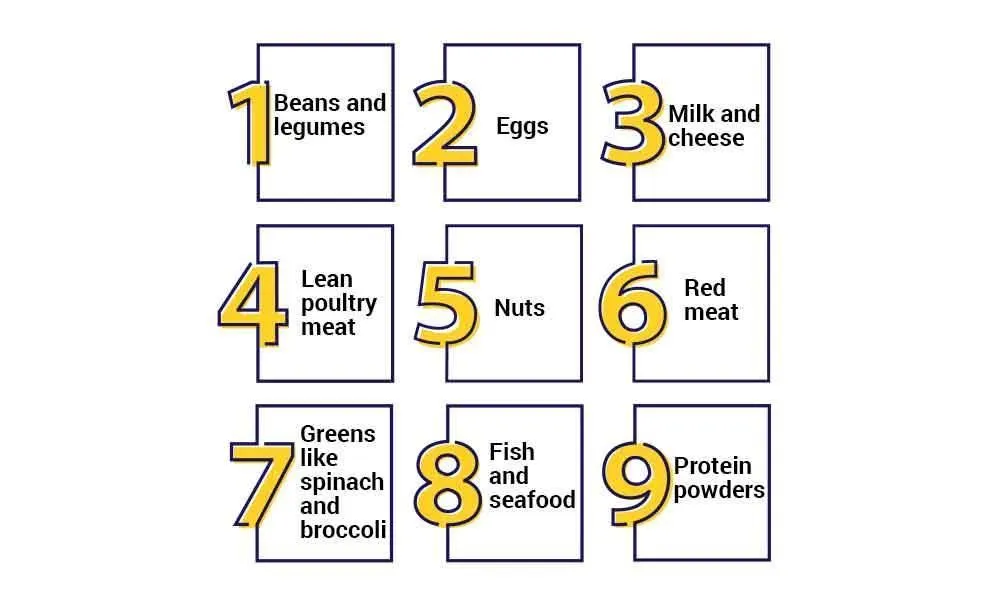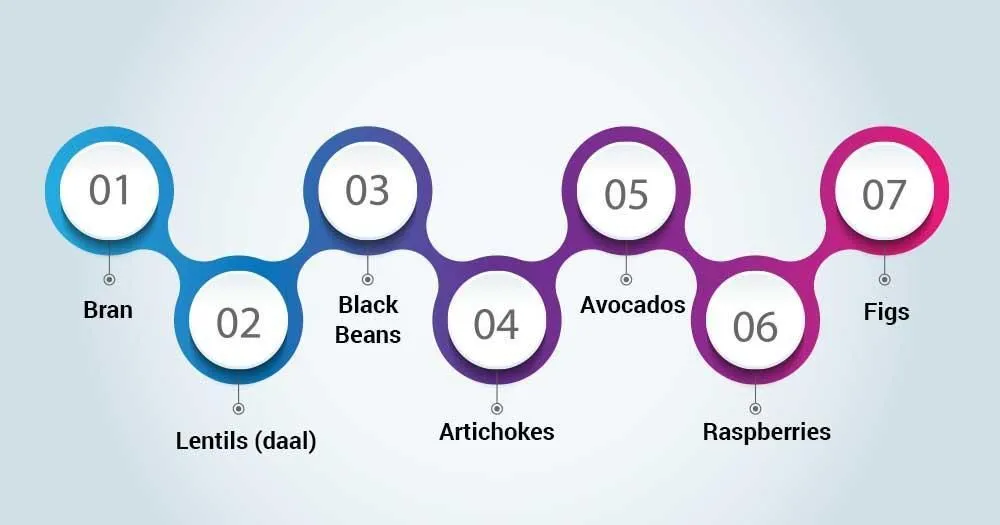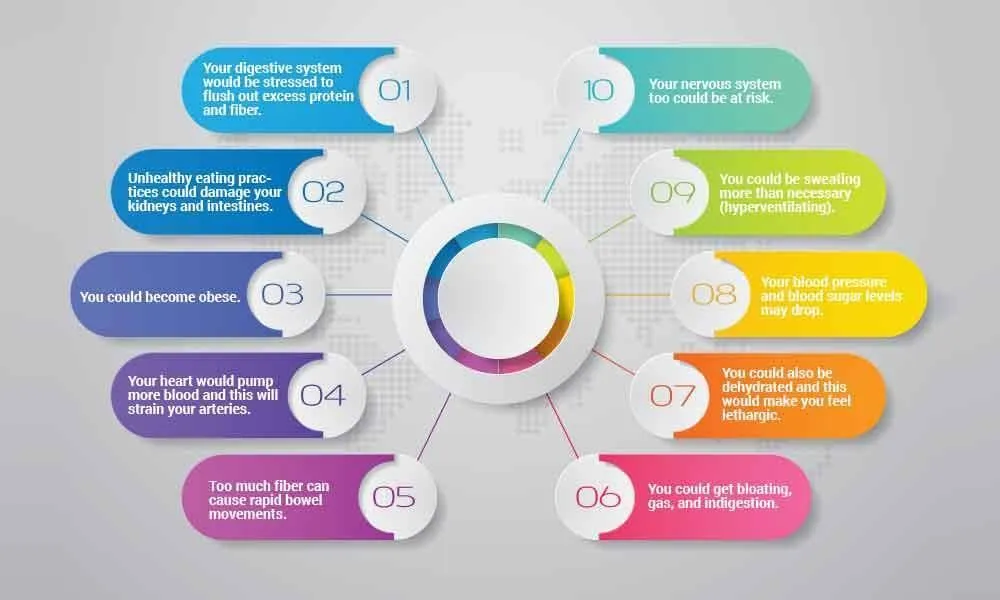Made of amino acid monomers, proteins are an invaluable component of our daily food intake. It is as essential to our basic consumption as it is in specialized diets. You wouldn’t find any weight-loss or muscle building diet plan without a hefty deal of this nutrient included in it. This nutrient also plays an important part in improving our fitness and strengthening our immunity.
All energy supplements are also loaded with a high ratio of this polypeptide, vitamins, minerals, and essential amino acids that are needed for the body’s repair and recovery. It pays to know which foods you can consider for daily intake and meal planning, and if they can help you shed some flab and look great too!
You should always start your day with a high dose of nutrients and minerals in the morning through breakfast. This would keep you powered enough and you can count on sharper reflexes throughout the day. We also recommend backing them up with milk or fruit juices for the best results.
There are several food options that you can eat to increase your protein intake and boost your health with a truckload of other healthy nutrients. These foods are also low in carbohydrates and you can eat them without worrying about gaining weight or belly fat.
Here are the benefits of taking protein-rich foods for breakfast:
Help you build, repair, rejuvenate, oxygenate, digest, and regulate all the regular digestive processes
Keep you feeling satiated and fuller for longer.
Adding fibrous foods to all your meals would help your body flush the toxins and waste out easily.
The key to getting the most of these healthy and nutritious foods is to follow an active lifestyle. An antithesis to a sedentary lifestyle, it should keep you away from malpractices like binge eating that lead to weight gain and a weaker respiratory system.
Note: You might want to consult a wellness expert virtually to make some new changes to your lifestyle. It is a smarter way to talk to the world’s leading experts online through audio/video conferencing on your smartphone at a fraction of the fees that you’d pay to your local service provider.
One should not take more than 30 gms of fiber and more than 50 gms of protein in a day.
You could be looking to build lean muscle mass, gain or lose some weight, or simply look for some interesting ways to include more protein in your daily diet. Our virtual fitness experts suggest these high-protein foods:
Tofu
Broccoli
Lentils
Chickpeas
Seitan
Peanuts
Quinoa
Mycoprotein
Walnuts
Spelt
Tempeh
Edamame
Teff
Almonds
Spirulina
Hempseed
Green peas
Cashews
Pumpkin seeds
Pistachios
Sunflower seeds
Almond butter
Hemp
Chia seeds
Flax seeds
The above list doubles up for the foods that you may eat to lose weight and build leaner muscles.
It is important to cut down on excess fats, carbohydrates, and calories that only cause faster weight gain. We recommend that you go through the following list of high-protein vegan foods to build leaner muscles. (Please note that we have also added some popular foods for non-vegetarian enthusiasts too).
The demand for plant sources for this amino acid has increased over the past few years. A part of the reputation is because the number of vegans is on the rise and people are looking for ways to add more green vegetables to their daily diet. Beans and legumes are rich in several other essential nutrients too.
Eggs are an obvious option for a healthy breakfast, especially whites. Every egg has about 75 calories, 7 grams of high-quality protein, 5 grams of fat, and 1.6 grams of saturated fat. This is in addition to iron, vitamins, minerals, carotenoids, and disease-fighting nutrients like lutein and zeaxanthin.
Dairy products, like milk and cheese, help in the body’s bone-building process. Cheese is a good source of good fats, calcium, vitamins A and B-12, besides minerals like zinc, phosphorous, and riboflavin. It also has a high content of omega-3 fatty acids.
Chicken and turkey breasts naturally facilitate weight-loss and muscle-building processes. White meat provides high-quality protein without any fat, as compared with red meats. Chicken and turkey can be cooked in many ways, and with different ingredients.
Nuts are a great source of protein and their fat content is good for the body and mind. It’s good to know that they also make you smarter. When taken along with dry fruits, these health foods normalize our hunger and metabolism process to hasten our weight loss process.
Lean portions of red meats are loaded with protein because these are made of animal muscle. They also contain omega-3 acids and riboflavin, and are low in sodium. But red meats should be taken in small portions because they may still contain enough saturated fat content too.
Beans are not the only plant-based food that is rich in proteins because there are spinach and broccoli too. In the past years, several culinary practices have integrated these green veggies into pasta, pizza, and commonly cooked dishes. They contain Vitamin A, C, and K1 plus iron and folic acid.
Red and white meats are not the only ones known to have a considerable amount of amino acids, fish and other seafood also provide the same value. They are extremely protein-rich and have been one of the famous ingredients in gourmet and home cooking for ages.
These health supplements are an indispensable part of fitness professionals’ diets. Whey powder is perfect for people who prefer to have milkshakes to build muscles or those who want to eat less but still fill themselves up properly. These powders can be either consumed as a liquid or be included in cooking.
Suggested article: Easy Ways to Sneak Protein Into Every Meal and Drink
Dietary fiber is a vital nutrient required for the proper functioning of the digestive tract. Lack of fiber in your diet leads to overeating, high cholesterol, and blood sugar levels, constipation, and hemorrhoids. If you want to treat your constipation or lose a few pounds, including the following high-fiber and high-protein foods will help you by a mile:
The simplest way to increase your fiber intake is to load up on some bran. Oat bran is a rich source of soluble fiber (12 grams per ounce) and it helps in lowering blood sugar and cholesterol levels. Corn (22 grams per ounce), wheat (12 grams per ounce), and rice (6 grams per ounce) bran are dense in this nutrient.
With 15.6 grams of fiber per cup when cooked, lentils are the best examples of healthy being incredibly delicious. Not only do they make a filling dish, but they’re also loaded with healthy nutrients. Lentils are more versatile compared to other legumes and it is easy to cook them.
Black beans can be thrown into salads, rice dishes, and mixed with other ingredients such as sweet potato and peppers to create a heart-healthy and filling meal. With 15 grams of fiber per cup, cooked, black beans are also packed with protein and complex carbohydrates.
We love our artichokes roasted with other vegetables. They have a high fiber content (10.3 grams for a medium artichoke), a fact that makes them an obvious choice for all kinds of vegetarian and non-vegetarian foods.
Also read: Smart Food Choices: Foods a Nutritionist Would Never Eat
Avocadoes taste great on whole-grain toast and in chicken salads. With 10.5 grams of fiber per cup of sliced avocado, there’s no further explanation needed on why avocados can create a filling breakfast.
Other important nutrients in avocados include omega-3 fatty acids, folate, vitamin B6, vitamin C, vitamin E, vitamin K, and potassium. Sure, avocados are high in calories due to their fat content but they’re rich in good fats, which makes them excellent for heart health.
Looking for a quick fix for your sugar cravings? Try having a cup of raspberries for 8 grams of fiber, a ton of antioxidants, and minerals. You can also use them to prepare a breakfast or dessert with coconut, Greek yogurt, or oatmeal. It has a high content of Vitamin C, carbohydrates, and manganese.
Figs are different from other food sources because they contain both soluble and insoluble fibers. One cup of dried figs will give you 14.6 grams of this digestive nutrient along with potassium, copper, manganese, pantothenic acid, and vitamin B6. Figs also help in lowering blood pressure and preventing macular degeneration.
Proteins and fiber could also be harmful when taken in excess or an ill-advised manner. You should check yourself against the following symptoms. We also recommend consulting a healthcare specialist promptly if you find any symptoms matching.
Your digestive system would be stressed to flush out excess protein and fiber.
Unhealthy eating practices could damage your kidneys and intestines.
You could become obese.
Your heart would pump more blood and this will strain your arteries.
Too much fiber can cause rapid bowel movements.
You could get bloating, gas, and indigestion.
You could also be dehydrated and this would make you feel lethargic.
Your blood pressure and blood sugar levels may drop.
You could be sweating more than necessary (hyperventilating).
Your nervous system too could be at risk.
These high-protein foods are not too hard to find in the local market and the grocery. Not only are these sources healthy but they are also yummy and versatile. Nutritionists too swear by the importance of including fiber in the daily diet to strengthen the digestive system and metabolic process.
But like in all food types, these should also be taken in moderation. But these are great to include as a part of the regular diet for gaining muscle mass. You can consult a virtual nutritionist for more information on a personalized 7-day diet plan as per your health conditions and allergies (if any).


